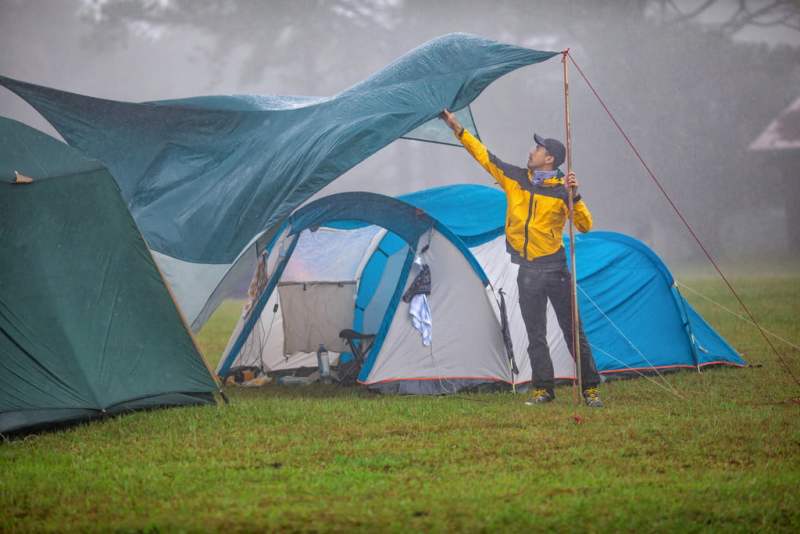Waking up to a rain forecast on the morning of a long-anticipated camping trip fills most campers with a sense of dread. The thought of wet gear, muddy trails, and soggy clothes might be enough to make you second-guess your adventure. But before you cancel your plans, you might be surprised to that camping in the rain doesn’t always have to ruin your parade. With the right preparation, you can turn this forecast into a positive and memorable experience. Don’t let the rain dampen your trip! Here are our best tips for bad weather.
Know before you go

You should never go into the outdoors feeling unprepared, and the key part of your preparation is checking the weather forecast. The more you know about what you’re getting into, the better prepared you can be for your trip. First, ask yourself the question: Does your proposed trip still work? Rain shouldn’t stop play, but torrential rain can mean that certain hikes, trails with river crossings, and even some campsites aren’t going to be an option. Evaluate carefully, and make the safe decision.
If you do end up choosing to go, this preparation time will give you a chance to re-waterproof some of your gear. If your boots are looking a little worse for wear, give them some treatment or even replace them with a new set to avoid squelching through your camping trip. Make sure you pack your tent with the higher hydrostatic head so you don’t wake up in a puddle in the morning. If possible, set up your camp before the rain starts, and have a backup plan if things go south.
Prioritize and protect your gear

Even hiking backpacks that claim to be waterproof have their limits. To ensure your critical gear — such as your sleeping bag, change of clothes, food, electronics, and medical or emergency supplies — stays completely dry, pack everything into waterproof bags or, better yet, multiple waterproof bags. Use lightweight dry bags to pack items into your hiking pack modularly. This helps when you get to camp, as you only need to pull out a single dry bag at a time, keeping the rest of your items dry.
Including a tarp in your gear is invaluable. Modern camping tarps are lightweight and easy to pack, and they can extend your tent’s porch area, create a cooking shelter, or be used as a groundsheet to prevent moisture from seeping into the tent. Just ensure the tarp doesn’t poke out from the edges or it will collect water and create more issues than it solves.
Get your pitch perfect

That patch of grass in the trees might look perfect, but if it’s at the bottom of a hill or near a river, think again. Choose high ground where water runs off, and avoid areas that could become waterlogged or swell overnight. Always check for tree hazards, such as old or dead trees, which could pose a danger during heavy rain and wind.
Look for natural shelter to help protect you while cooking or heading out at night, which also provides added protection for your tent. Pitch your tent facing away from the prevailing wind to prevent rain from entering every time you open it. This approach also gives your tent a break from taking the full force of the weather.
Avoid cotton and down, but layer up

When camping in the rain, wear the right layers: a high-quality waterproof jacket and pants, as well as waterproof boots. Underneath, opt for breathable, quick-drying layers made from synthetic fabrics or merino wool. Cotton is not suitable because once it gets wet, it stays wet and loses its insulating and breathable qualities.
For the same reason, you should avoid down-insulated gear in rainy conditions. Synthetic and wool materials retain warmth even when damp and they dry faster. A useful tip: Hang damp synthetic clothing under a tarp to partially dry it, then put it on to let your body heat do the rest. Put on a damp T-shirt before climbing into your synthetic sleeping bag to dry it out overnight.
Stay warm, fed, and pack alternative entertainment

One of the best ways to stay warm and maintain morale during a rainy camping trip is to have a fire. Ideally, gather firewood before the rain starts, or move it to a sheltered location as soon as possible. Stack your wood for airflow and quicker drying. Bring tinder or kindling to help start the fire, or split logs to find drier wood inside. Your fire will dry and warm you while also preparing you for a comfortable night’s sleep.
It can be tempting to forego the evening meal and retreat to your tent for an early night when the rain is pouring. Sure, you can survive for a night or two off snack bars, but if you’re out on the trail, trust us when we say you will want to eat a proper meal and fend off hiker hunger for the next day. Dehydrated or ready-to-eat meals that cook quickly can keep you sheltered sooner, but there are also a lot of easy camping meals out there that will keep your energy up. Eating a hearty meal will fuel you for the night, help maintain your body temperature, and lift your spirits.
On a wet camping trip, you can find yourself spending a lot of time in your tent. Keeping yourself busy is important and helps raise morale, too. Adventure books, playing cards, and board games are all great ways to occupy yourself and take your mind off the rain. If you’re out on a longer trip, you might also choose to keep a journal or look at the map and plan your next few days. Plus, a rainy trip gives you a great excuse for an early night and much-needed rest.
Camping in the rain might not seem like the most fun thing in the world, but with the right preparation, you can turn your situation into a positive experience. Plan ahead, choose your gear wisely, and enjoy the meditative pitter-patter of the rain while you take in the fresh air and your favorite adventure books.




